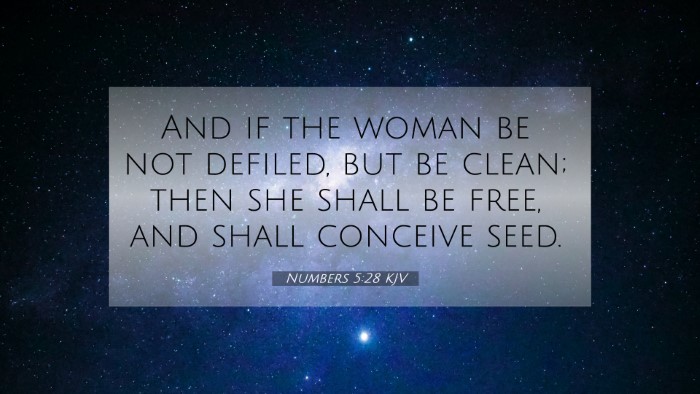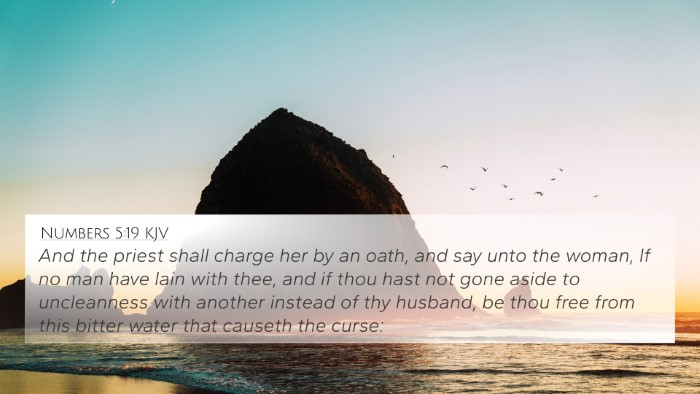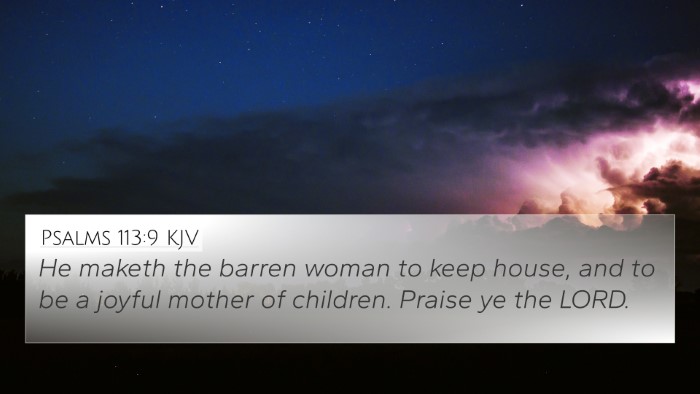Understanding Numbers 5:28
Numbers 5:28 is a verse situated within the context of the rituals concerning jealousy and suspicion in marital fidelity. This verse states, "But if the woman is not defiled, but is clean; then she shall be free, and may conceive children." This seemingly simple statement has profound implications for understanding the laws governing marital relations and divine justice in the Israelite community.
Verse Context and Significance
The chapter outlines a method for determining a woman's fidelity when suspicion arises. This ritual highlights the importance of maintaining purity within the covenant of marriage and reflects the broader theme of justice in social relations.
Commentary Insights
-
Matthew Henry: Henry highlights that this verse embodies God's provision for justice in Israelite society. The woman's vindication is a reflection of God's character, who seeks to protect the innocent. Henry emphasizes the emphasis on purity and the community's role in preserving moral standards.
-
Albert Barnes: Barnes elaborates on the ritual's purpose, underscoring that it serves to reveal truth and protect family integrity. He notes the cultural significance of reproductive health in that context, where fertility was seen as a divine blessing. The assurance of being "free" and able to conceive was crucial for the woman's status in society.
-
Adam Clarke: Clarke provides a deeper theological insight, linking the ritual’s implications to the broader narrative of sin and redemption. He proposes that this process foreshadows Christ's ultimate redemption, where believers are declared clean through faith.
Thematic Connections
Theologically, Numbers 5:28 resonates with themes of fidelity, sin, and divine justice. The resolution of jealousy through a divine ritual speaks not only to the practicality of social laws but also to the divine oversight of human relationships.
Cross-References
This verse can be linked to several other scriptures, enriching our understanding through cross-referencing. Below are some notable connections:
- Deuteronomy 22:20-21: Addresses accusations of unfaithfulness and the required proof—reflecting a similar theme of justice.
- 1 Corinthians 11:3: Discusses the roles and relationships within marriage, emphasizing the importance of faithfulness.
- Matthew 19:9: Jesus' teachings on divorce and marital fidelity mirror the principles established in Numbers.
- Hebrews 13:4: Affirms the sanctity of marriage, reinforcing the need for purity among spouses.
- John 8:11: Jesus’ compassion towards the accused woman reflects God’s grace, analogous to the outcomes in Numbers 5.
- Galatians 5:22-23: Discusses the fruits of the Spirit, which include fidelity, linking personal character to divine standards.
- Psalms 51:10: The cry for a clean heart resonates with the spiritual purity sought in Numbers 5.
Conclusion
Numbers 5:28 not only provides insight into ancient Israelite customs but also lays a foundation for understanding divine justice regarding marital fidelity. Its connections with other biblical texts enhance our comprehension of fidelity, grace, and the importance of community standards. Through cross-referencing, we can appreciate how these themes echo throughout scripture, fostering a deeper relationship with the Word and understanding God's expectations for His people.
Further Study
For those seeking a deeper understanding of how to engage with biblical texts, tools like a bible concordance or a bible cross-reference guide can be invaluable. They facilitate exploring bible verses that relate to each other, allowing for a comprehensive view of themes and teachings across scripture.







